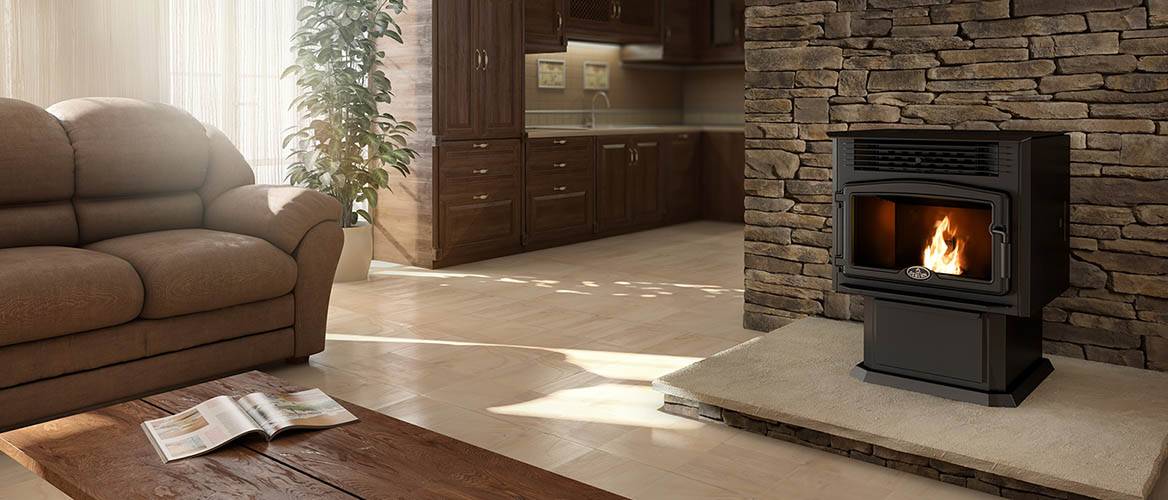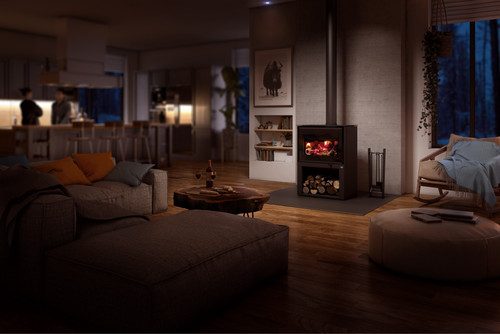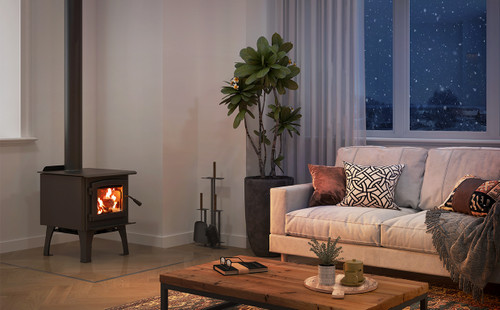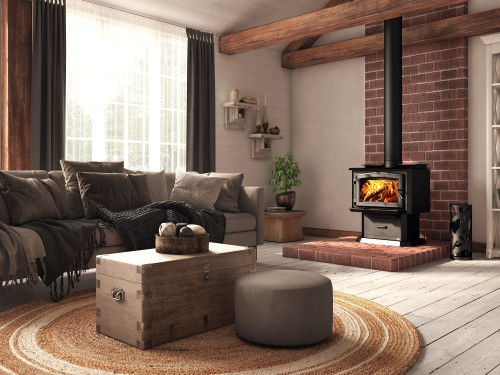Product Overview
Osburn 2500 Pellet Stove - OP00025

The New Osburn 2500 Pellet Stove Is A Traditional Steel Pellet Stove With A Large Window And A Heating Capacity Of Up To 2000 Square Feet
The new Osburn 2500 pellet stove is an entry-level appliance, roughly comparable to the 3000 model, whose appearance is more like that of a conventional wood stove. Although slightly different in some respects than its congener, it still retains the same distinctive signs of the brand.
This pellet stove is made from high-quality materials: Canadian steel of a higher grade, glass ceramic imported from Germany, heat exchangers made of stainless steel and thermosetting powder paint. Despite these real assets, worthy of a remarkable design, this product is offered at a very competitive price in addition to being eligible for certain credits and programs (government incentives).
Responding largely to the next highest standards of solid fuels and environmental protection, the Osburn 2500 has an incredibly low average of particles emission rate below 0.96 g/h.
Thanks to easy installation, intuitive electronic control and easy to use thermostatic control, the Osburn 2500 is for anyone who wants nothing complicated. It is also easy to clean with access to removable components without tools.
Appliance performance (1)
| Fuel type : | Pellet (Premium grade or better) (2) | |
| Recommended heating area-ft² : (*) | 500 - 2,000 | |
| Hopper capacity : | 60 lb (27kg) | |
| Maximum burn time : (*) | 51 h | |
| Maximum heat input rate : (3) | 39,260 BTU/h (11.5 kW) | |
| Overall heat output rate < : (4) | 6,648 BTU/h (1.95 kW) to 28,540 BTU/h (8.36 kW) | |
| Average overall efficiency : (5) | 70.3 % (HHV) (6) | 75.8 % (LHV) (7) |
| Optimum efficiency : (8) (9) | 78.4% | |
| Optimum heat transfer efficiency : (10) | 73% | |
| Burn rate : | 1.2 - 4.7 lb/h | |
| Average particulate emissions rate : (11) | 0.96 g/h | |
| Average CO : (12) | 7.6 g/h | |
| Average electrical power consumption-ignition cycle : (13) | 2.60A (312W) | |
| Average electrical power consumption for continuous operation : (13) | 1.3A - 2.5A (51W - 140W) | |
(1) Values are as measured per CSA B415.1-10, except for the recommended heating area, hopper capacity, maximum burn time and maximum heat input rate. Results may vary depending on pellet quality, density, length, and diameter.
(2) Grades of pellet fuel are determined by organizations such as Pellet Fuels Institute (PFI), ENplus and CANplus.
(*) Recommended heating area and maximum burn time may vary subject to location in home, chimney draft, heat loss factors, climate, fuel type, feed rate, fuel level, and other variables. The recommended heated area for a given appliance is defined by the manufacturer as its capacity to maintain a minimum acceptable temperature considering that the space configuration and the presence of heat distribution systems have a significant impact in making heat circulation optimum.
(3) Based on the maximum burn-rate and a dry energy value of pellet at 8,600 BTU/lb.
(4) As measured per CSA B415.1-10 stack loss method.
(5) Efficiency based on radiated and delivered heat when allowing cycling from high to low burn to simulate thermostat demand. LHV % is based on manufacturer’s estimation.
(6) Higher Heating Value of the fuel.
(7) Lower Heating Value of the fuel.
(8) Performances based on a fuel load prescribed by the standard at 7 lb/ft³ and with a moisture content between 19% and 25%.
(9) Optimum overall efficiency at a specific burn rate (LHV).
(10) The optimum heat transfer efficiency is for the low burn rate (using HHV) and represents the appliance’s ability to convert the energy contained in the wood logs into energy transferred to the room in the form of heat and does not take into account the chemical losses during combustion.
(11) This appliance is officially tested and certified by an independent agency.
(12) Carbon monoxyde.
(13) Unless stated otherwise, measures were taken directly at the main power source and include all electrical components present in the appliance.
General features
| Combustion technology | Top-feed |
| High-efficiency certified appliance | Yes, EPA 2020 approved |
| Electronic igniter | Yes |
| Flue outlet diameter | 3" |
| Type of chimney | ULC/ORD-C441, CAN/ULC S609, UL 641 (TYPE L) |
| Baffle type | Stainless steel |
| Approved for an alcove installation | Yes |
| Approved for a mobile home installation | Yes, with fresh air intake |
| Shipping Weight | 286 lb (130 kg) |
| Door type | Single, glass with cast iron frame |
| Glass type | Ceramic glass |
| Glass surface – dimensions (Width X Height) | 17 1/4" X 9 1/2" |
| Glass air-wash system | Yes |
| Noise level at 6 feet | 47 bBa (+/- 3 dBa) - 60 dBa (+/- 3 dBa) |
| Overall dimension (Height) | 33" |
| Overall dimension (Width) | 25 7/8" |
| Overall dimension (Depth) | 30" |
| Adjustable threaded legs | Yes |
| Voltage and frequency | 120 VAC - 60 Hz |
| AC Current | 1.3A/120VAC - 2.5A/120VAC |
| Main control board fuses | 8A - 250V |
| USA standard (emissions) | EPA |
| Canadian Standard (emissions) | CSA B415.1-10 |
| USA standard (safety) | UL 1482, ASTM E1509 |
| Canadian standard (safety) | ULC S627 |
| Tested and listed as per applicable standards | By an accredited laboratory (CAN/USA) |
| Warranty | Limited lifetime |
| Minimum clearances to combustibles* (Data expressed in inches. 1 inch = 25.4 mm) |
||
| Canada | United-States | |
| Clearance – back wall | 3" | 3" |
| Clearance - corner | 3" | 3" |
| Clearance – side wall | 6" | 6" |
| Clearance – top (measured from the platform on which the appliance is installed)** | 48" | 48" |
|
* The information given on the certification label affixed to the appliance always overrides the information published in any other media (owner's manual, catalogues, flyers, magazines and/or web sites). |
||
|
** Some appliances have been tested with a low ceiling. Before setting up your unit, refer to the installation manual. |
||
Guides
Osburn 2500 pellet stove installation manual
Osburn 2500 pellet stove operation manual
Osburn 2500 pellet stove dimensions
How to replace the igniter
How to replace F-160 thermodisc
How to replace L-250 thermodisc
How to replace the exhaust blower
How to replace the combustion blower
How to replace the convection blower
How to replace the auger motor
How to access the fuses
How to test a component
Components location







